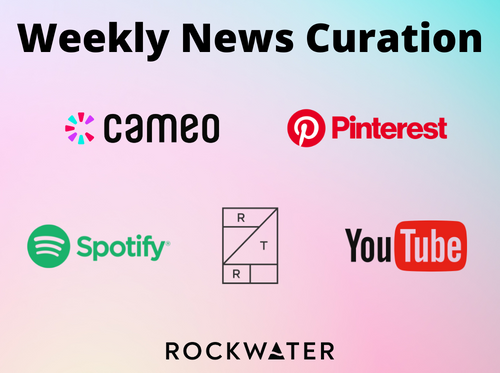Nike’s 7 Metaverse Trademarks, Fox’s $100M NFT Fund, and the Launch of Goldbelly TV
What We’re Reading
5 themes/ articles + RockWater analysis to make you a better investor and operator.
———
Fox Bets Big on Blockchain
Axios, 11.4.21
- Fox Entertainment was the first major TV studio to debut its own blockchain division in May
- Fox plans to double down on its investments in blockchain technology by introducing more NFTs and digital collectibles for its shows and franchises in the coming months
- Fox Corp’s Blockchain Creative Labs CEO Scott Greenberg sees NFTs and other digital assets as an opportunity to create more fan engagement not just across all of Fox’s properties, like Fox Sports, Fox Entertainment and Fox News, but third-party franchises too
The RockWater Take by Michael Booth
Fox Corporation’s Blockchain Creative Labs (BCL), a $100 million NFT / Blockchain fund launched this past summer, has shown promising results. During last week’s earnings call, CEO Lachlan Murdoch said “We are very pleased with the early results of our investment.” This comes on the heels of BCL beginning to deploy its capital – having just launched an NFT marketplace for the TV show ‘Masked Singer’. 120,000 of those NFTs having been gifted to fans. Additionally, BCL just inked its first external partnership with the WWE to set up a Wrestling NFT marketplace.
Why You Need to Pay Attention to BCL:
1. I’ve been talking a lot about ‘Play to Earn’ (P2E) gaming as an attractive mass top-of-funnel on-ramp into Web 3; however, Pay to Watch (P2W) will also be a big on-ramp to follow. NFTs effectively give their owners equity value in the underlying IP, i.e. – film / TV franchises in the case of Fox Corp. Content owners can essentially crowdfund audience acquisition by granting fandoms NFTs for meeting certain engagement benchmarks, such as: consistent tune-in, participation in audience polls, follows on social media, etc. As said by BCL’s CEO Scott Greenberg “There’s a notion of creating digital economies around brands that we think that can apply… you can turn your time spent into earnings.” All else equal, TV / film audiences will long term migrate to the shows that financially reward them for building brand equity. Fox Corp is the only studio making this big of a bet on NFTs and BCL’s continued performance will be a signal for what’s to come with other studios adopting NFT strategies.
2. It’s interesting that in the WWE partnership, Fox is positioning themselves as an NFT for-hire company, where they can shop BCL’s capabilities around with other studios and content partners for a fixed fee or revenue split. With all that’s happening in the streaming wars, studio execs are spread thinner than ever deploying their IP at new revenue opportunities. NFTs are exciting, but their revenue model remains unproven in film / TV, and they are esoteric for studio corporate development teams to stand up. This dynamic creates a landscape where a small number of key industry players will make critical mass investments and license their capabilities to the industry writ large. Fox is the first mover with $100 million already invested and an appetite to double down, it will be interesting to see what other studios have an appetite to compete.
———
Nike is Quietly Preparing for the Metaverse
CNBC, 11.2.21
- Nike has filed seven trademark applications as it prepares to enter the metaverse
- As part of the application, the company indicated its intent to make and sell virtual branded sneakers and apparel
- People familiar with Nike’s plans said the space is a priority for the brand
The RockWater Take by Chris Erwin
Digital identity and expression is critical in a virtual socio-economy. And our new reality is increasingly digital → video-enabled remote work, digital banking and decentralization, digital rights via NFTs, friendships-commerce-screentime via social media, immersive gaming, etc.
This is not just digital transformation. This is a new digital-native reality. The metaverse. And winning in the metaverse requires big and new digital moves by today’s brands.
Nike, a known digital leader, is following a good sequence. They’ve already conducted deep digital experiments since 2019, like a virtual pop-up store, avatars for Fortnite, a Roblox Air Max event, and blockchain-verified ownership of physical sneakers. But their trademark applications, and job listings like “Virtual Material Designer”, signal more company lean-in.
This is the way.
The metaverse opportunity is difficult to imagine because no one really understands it. But its at least billions of dollars, but more likely in the trillions.
With a prize like that, companies have to really go for it to stand out. Like Facebook changing its name to Meta, and committing $10 billion to the cause. And we’ve loved seeing fashion brands embrace digital identity and commerce faster than other categories. Just read about other metaverse experiments from Balenciaga and Gucci.
But it’s not just about the far out future. But also about the now:
- Supply chain woes make physical commerce a logistical and economic nightmare. The digital good supply chain is a very different story
- Consumer preferences can adjust monthly, if not daily, pending the latest drop from Supreme or NTWRK. Digital product can adapt to the timeliness of now
- Kids consumption times in the metaverse is staggering (75% and 68% of 9-12 year-olds in the US are regular users of Roblox and Minecraft, respectively), and revenue experiments are minting millions. And who are kids? They’re the future brand loyalists and economic drivers
We’re excited to see what Nike does here. The metaverse playbook is being written by these early movers who strive to navigate this new territory. And we’ll all be better for it.
———
Goldbelly Launches Goldbelly TV
Hollywood Reporter, 11.9.21
- Goldbelly – the food e-commerce platform that delivers fully cooked meals as well as meal kits nationwide from more than 1,000 restaurants – is launching video platform Goldbelly TV on its website
- Studios arm will be run by vet unscripted producer, Art Edwards
- Goldbelly TV’s content will include both on-demand and livestream videos
The RockWater Take by Alex Zirin
I’m particularly excited about this launch and what it means for the future of food media. Over the last decade, we’ve seen a few new platforms find their way out Food Network’s shadow: Eater (Vox Media), Munchies (Vice), FirstWeFeat (Complex), Food52, the (problematic) Bon Appetit Cinematic Universe, and, of course, the great Netflix Food Empire.
While these various organizations have focused their core value proposition around high-quality content, talent, and journalism, we have yet to see a meaningful offering from a commerce-centric food business.
Although other platforms like YouTube and Walmart have launched a few live, shoppable video offerings, most have focused on cooking equipment rather than taste and sustenance. Goldbelly’s core business allows customers to have a near-identical eating experience to what they’d have if they were to travel to one of their iconic purveyors.
By centering food content around very specific and attainable food experiences, Goldbelly is bringing a wholly differentiated content strategy to market. Now, customers at home will be able to order (and taste) the exact same food they see prepared on screen, exactly as it’s prepared, no matter their level of cooking skill.
This is hugely impactful from the perspective of combining content consumption and product purchase. I, for one, have been known to make some rash decisions when hungry, and I’m rarely hungrier than I am when watching some Gelb-esque piece of food content.
This quote says it all: “You can really consume the content twice, with your eyes and with your belly.”
We have long been bullish on livestream shopping in the US market across all sectors, but I believe that there is a lot of real estate to be had in the food space: Delivery Meal Kits, Local Delivery, Restaurant Gift Cards, and Shippable Food Experiences are a just few that feel particularly ripe.
———
Recent Livestream Commerce Developments
- YouTube’s About To Get A Lot More Shoppable As It Assembles New Team, Readies ‘/Shopping’ Hub — TubeFilter, 11.9.21
- Facebook Expands Live Shopping Offering to Prepare for a Bustling Holiday Season — Digiday, 11.1.21
The RockWater Take by Andrew Cohen
Heading into the holiday shopping season, both YouTube and Facebook are leaning hard into the livestream shopping products that they’ve quietly been developing over the past year or two. Both have announced daily live shopping events that kick off this week.
Key takeaways:
- These initiatives speak to the “product gap” that we’ve written about before. Facebook is focusing on retailers, and YouTube is focusing on retailers and creators with their own product lines. This feels like “US Livestream Shopping 1.0”. For livestream shopping to take off, there will need to be a marketplace for creators to access products to sell and authentically endorse, and for retailers to find engaging personalities that can sell their products in a livestream format. Facebook recently rolled out a feature to allow creators and brands to co-stream live shopping events across both their channels. We believe this is just the beginning, as bridging the “product gap” will be a major mission for those looking to win the future of the US livestream shopping market.
- YouTube’s 3 pillars for social shopping: 1) making all video shoppable whenever possible, 2) taking live to the next level in terms of production value, and 3) getting relevant video recommendations within shoppable video.
- YouTube started testing its livestream shopping products with mid-size creators before launching a highly-publicized event with A-list personalities. We think that’s a smart sequencing strategy to ensure that the UX for both creators and shoppers has been fully refined before it gets launched to the mainstream.
- Although neither platform has an exclusive category focus, the products and programming for both platforms skews heavily towards the beauty space. This makes sense, as beauty is one of the most dominant social commerce categories on the major social platforms, and other niche subcategories like collectibles and streetwear are already being covered by dedicated upstarts like Whatnot and NTWRK.
———
NFT Upstream Rights Deals Announced
- Universal Music launches metaverse group based on Bored Ape NFTs — Ledger Insights, 11.12.21
- Timbaland Unites With Bored Ape Yacht Club Owners to Form Artist-Owned Ape-In Productions — Variety, 11.12.21
The RockWater Take by Michael Booth
Two related happenings from last week: 1) Universal Music Group’s 10:22PM metaverse label signed “Kingship”, a newly formed band featuring four Bored Ape Yacht Club NFTs as its front men, and 2) Timbaland launched his own BAYC label ‘Ape-in-Productions’ to launch metaverse music / concerts through.
As catch up, Bored Ape Yacht Club is a successor to the Cryptopunks movement, where 10,000 NFTs were minted that depict different apes engaging with aspects of pop culture in a very Warhol-esque way. There has been a massive bidding war for BAYC NFTs, with one selling for $3.4 million in October. Most importantly, because each BAYC owner retains the commercial rights for their individual NFT, there are a multitude of different licensing plays that owners are starting to explore… like forming NFT bands / record labels!
NFT music artists may sound wacky on face value, but if you’ve been following China digital celebrities was a trend bound to come to the US. According to data from iiMedia Research, China’s virtual idol industry was worth $487 million in 2020 and is forecast to top $875 million in 2021.
More fundamentally, it goes to show how many upstream rights opportunities there are for decentralized community-led IP. I wrote about Nouns DAO a few months back, whose sole goal is to incubate community-owned IP that reaches mass audience scales like that of Marvel’s cinematic universe. The more I dwell on it, the more bullish I am on decentralized community-owned IP. The mass market value prop is simply too compelling. Consumers are now empowered to define what’s “cool”, a privilege once held in monopoly by multinational corporations. And better yet, members of these IP community members get to see the financial upside from the value they create. A more equitable consumer landscape, with big implications for traditional IP studios.
———
If these insights are relevant to projects you are thinking through, ping us here. We’re always excited to riff through ideas!



